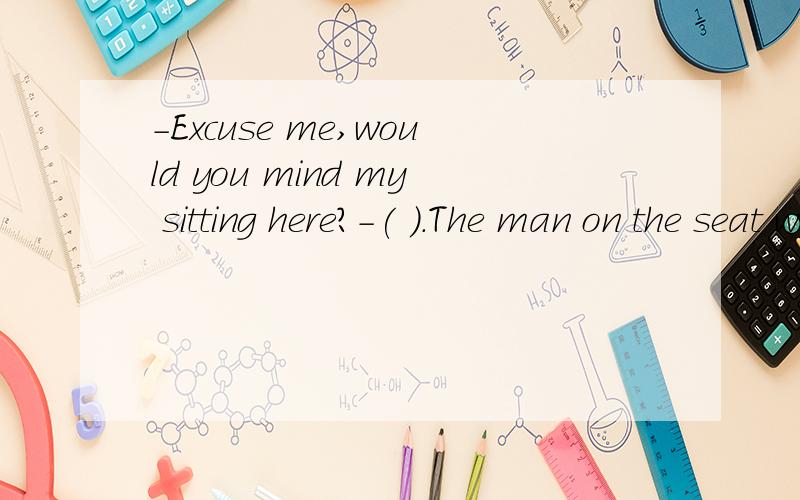-Excuse me,would you mind my sitting here?-( ).The man on the seat will return soon.A.Yes,pleaseB.Not allC.No,thanks.D.I'm afraid not
来源:学生作业帮助网 编辑:作业帮 时间:2024/05/02 23:40:58

-Excuse me,would you mind my sitting here?-( ).The man on the seat will return soon.A.Yes,pleaseB.Not allC.No,thanks.D.I'm afraid not
-Excuse me,would you mind my sitting here?
-( ).The man on the seat will return soon.
A.Yes,please
B.Not all
C.No,thanks.
D.I'm afraid not
-Excuse me,would you mind my sitting here?-( ).The man on the seat will return soon.A.Yes,pleaseB.Not allC.No,thanks.D.I'm afraid not
可以填 I'm sorry but I do.
一、Would (Do) you mind后接doing sth.时,表示希望对方做某事.
其中would 比 do语气更委婉,熟人之间说话时,可用do代替would.如:Would / Do you mind showing me the way to the airport?请你告诉我去机场的路好吗?
二、Would (Do) you mind 后接one's doing sth.时,用来请求允许或询问对方是否介意自己或别人做某事.
其中形容词性物主代词one's在口语中可用代词宾格担当动名词的逻辑主语.如:Would you mind my / me asking you a few questions?我请教你几个问题好吗?
三、Would (Do) you mind 后接if从句时,也是用来表示请求对方是否介意某人做某事.
其中在“Would you mind if 从句”句型中,从句谓语常用一般过去时,而“Do you mind if从句”句型中,从句谓语常用一般现在时.如:1.Do you mind if he attends the meeting?他参加会议好吗?(= Do you mind his attending the meeting?) 2.Would you mind if I took his place?我代替他好吗?(=Would you mind my taking his place?)
四、关于如何回答该句型的问题.
1.若表示“不介意”或“同意”时,常用否定形式.如:
① No,of course not.
② No,certainly not.
③ No,not at all.
④ No,go ahead.
⑤ No,do as you like.
⑥ No,indeed.
⑦ No,please.________
⑧ No,I don't mind.
⑨ No,do it please.
⑩ Not in the least.等.
2.若表示“介意”或“不同意”时,则常用较委婉的方式加以拒绝.如:
① I'm sorry but I do.
② Sorry,you'd better not.
③ I'm afraid you can't.
④ I wish you wouldn't ...
⑤ I'm sorry,but it's not allowed ...
⑥ Yes,I do mind.等.
其中,很少用Yes,I do mind来回答,因这种答语显得较生硬.
D
D
选择D 翻译是--打扰一下,你介意我坐这吗? --恐怕不能,坐这位置上的那个男人很快就回来了。
D
此题应选D
A意味着是的我介意 ,请坐
B要写也得是Not at all 且后面说原本坐在这的人快回来了,说明不想让他做,因此大错特错
C语境不符合,应用于别人给你什么东西,你不要的委婉回答
D意思是恐怕不行